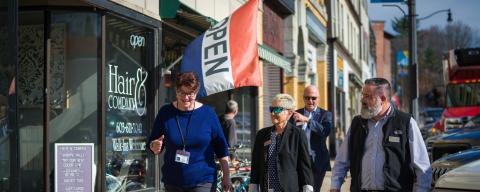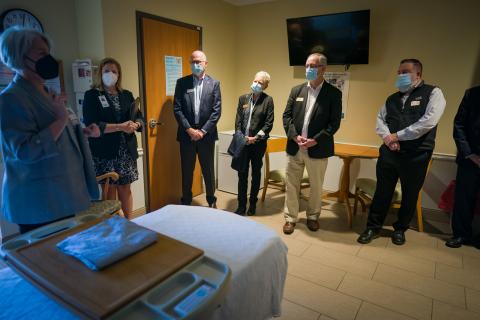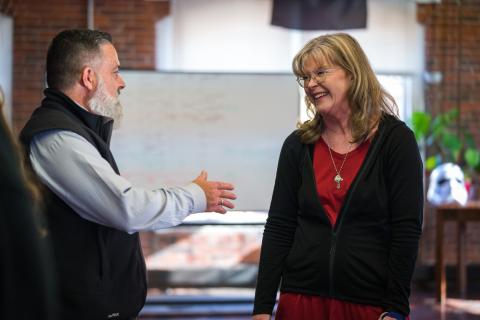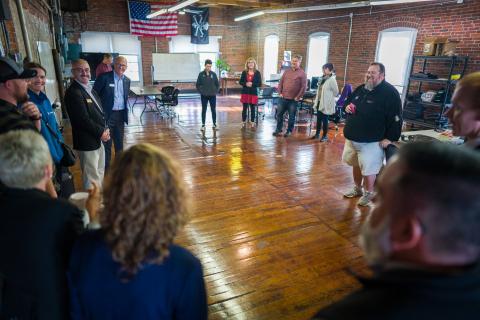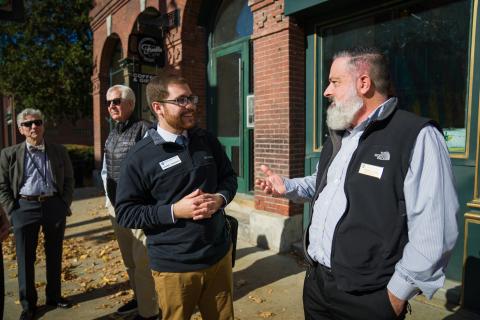UNH President's Embrace NH Tour Stops in Rochester, Franklin, and Laconia
For two days in early November, UNH President James Dean and several members of the University’s leadership team traveled throughout New Hampshire to highlight recent efforts and projects that have positively impacted the state. The tour demonstrated the Embrace New Hampshire strategy to sustain UNH’s reputation as a “trusted and valuable partner in advancing New Hampshire’s quality of life and in supporting our economy.”
The goal of the tour was to provide University leadership with an opportunity to experience first-hand the outcomes of work with our community partners, as well as seek input from community constituents on how the institution can best allocate its resources and support to help enhance the state’s economy and quality of life.
One of the first stops on the tour was Rochester, New Hampshire, which has partnered with UNH Cooperative Extension on multiple programs and efforts, including the First Impressions program focused on downtown revitalization, as well as an assessment of opportunities and barriers to linking the downtown to its many recreational and natural assets, including a rail trail and walking trails along the Cocheco River.
On day two, the bus tour included a stop in Laconia, New Hampshire, where the President and University leadership met with the principles from Rogue Space Systems, which designs satellite vehicles and systems. The visit highlighted partnerships that the company has with the institution’s Earth, Oceans, and Space Program. Belknap County Extension’s Economic Development Field Specialist Jada Lindblom joined the stop, given Rogue’s engagement in various economic development efforts in Laconia and Belknap County.

In the background is a dilapidated mill building that will be converted to commercial space by a prominent developer in the state.
President Dean and members of the leadership team also made a stop in Franklin, New Hampshire, where, in 2015, UNH Cooperative Extension’s Community and Economic Development team began working with various groups and community leaders to help them envision the future of Franklin. At that time, the city faced significant economic challenges, including disinvestment in the downtown, vacant buildings, underutilized waterfront areas, and a lack of housing. It was also recognized that each of these challenges posed future opportunities. The community articulated its vision for the future through use of diverse community engagement strategies. These strategies included storytelling exercises, focus groups with various community groups and constituents, and a community design charette which required significant community engagement through visioning, wayfinding, and general public input. This process, co-facilitated by UNH Extension and Plan New Hampshire, tied the overall vision together and resulted in a visual rendering of the downtown.
In just seven years since the design charette, the city has seen $75 million in new investment in the downtown, including rehabilitation of dilapidated mill buildings for housing and commercial enterprises—including a brewery—revitalization of a waterfront park, and development of a whitewater park known as Mill City Park. Mayor of the City of Franklin, Jo Brown, stated, “UNH was a catalyst that helped pave the way for many of the investments that we have seen.”
Thanks to the efforts of local leaders and residents like Mayor Jo Brown, entrepreneur Marty Parichand and redevelopment catalyst Todd Workman, the momentum that began in Franklin during 2015 continues today, helping the city achieve the vision that it established in 2015. Continued investments are allowing Franklin to revitalize and become more resilient for the future. Mayor Brown highlights this by saying, "UNH supported Franklin in embarking on an engagement process that led to the people of Franklin organizing for change. Seven years later, we are seeing the fruits of that engagement, including new and diverse housing, revitalization of dilapidated mill buildings, new businesses like an outdoor outfitter and a major kayak park (Mill City Park), $75 million in investment in the redevelopment of the downtown. The people of Franklin ultimately made it happen."
While this was an impactful visit that engaged community partners and provided opportunity for dialogue, this is just one of many future ways that the institution can stay connected with community stakeholders to learn of the great work that is happening in partnership with UNH, as well as the ways we can partner to support communities, businesses, organizations, and the people of New Hampshire in the future.
